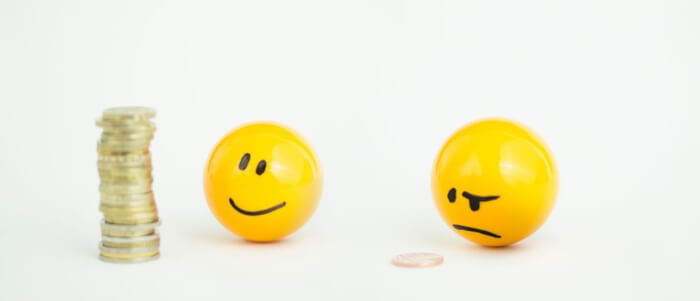How much money do you need to live a happy life? The latest research revealed that the real number might not be what most people believe.
Studies show that money can buy you happiness - to some extent. But how much does that happiness really cost?
 Source: Market Watch
Source: Market Watch
A 2010 study from Princeton showed that a person who earns $75,000 per year can reach the threshold of happiness. The researchers looked at the link between a person's annual income and their emotional state and assessment of life.
The results showed that emotional happiness leveled off at $75,000, and that having a higher income level (like $100,000) didn't make any significant difference. Research also shows that with incomes below $75,000, people have lower overall happiness and satisfaction levels, and higher levels of stress and sadness.
However, a new study has shown different results from what we have believed for a decade.
Looking at the complex relationship between money and happiness, the 2021 data shows that happiness actually increases as a person's income increases. Research suggests that the more money we make, the happier we become (or rather, we have the means to buy material things or experiences that make us happy and fulfilled).
 Source: BBC Science Focus Magazine
Source: BBC Science Focus Magazine
But what defines happiness?
The definition of happiness varies from person to person. "While a person's happiness often depends on their safety and well-being—on their salary—it also depends on their values," says mental health therapist Billy Roberts, said.Of course, each person is guided by different values. For some, value lies in power, others find value in self-care.
"A person who is driven by power might have different financial needs than someone who is driven by security. These factors affect happiness or a person's perception of happiness, These factors can affect a person's happiness or perception of happiness, altering the amount of money they truly need to feel satisfied emotionally." explains Roberts.
"At the end of the day, the salary should support a value-driven lifestyle," Roberts explains, "so the number is less important than that number allowing a person to drive in their 'values lane,' so to speak."
Clinical psychologist and psychology professor Margaret Sala asserts: Poverty can amplify the experience of unhappiness and stressors. In other words, lower income levels may increase perceptions of unhappiness or other negative emotions.
"Illness can be much worse for those who are poor and unable to seek medical care," Sala gives an example of things that affect happiness levels. "Not getting help with difficult tasks that those with more comfortable lifestyles often don't need to worry about, such as childcare or housecleaning".
On the other hand, Sala believes that some individuals with high salaries are not able to enjoy the small pleasures in life due to stressful and time-demanding jobs. A recent LinkedIn study found that employees in the US who earn more experience significantly higher levels of stress. The rate is up to 68% higher for those with an income of more than 200,000 USD per year.
 Source: The Motley Fool
Source: The Motley Fool
On the other hand, the link between money and happiness isn't just a feeling or a perception: There's a scientific theory behind the phenomenon.
"From a neuroscience perspective, scarcity of money and resources signals to our brain that there is a threat to our survival," says Renetta Weaver, PhD in metaphysics and clinical social worker said. In fact, poverty can affect a person's cognitive function, changing the way they think and reducing their performance at remembering words and processing speed.
In the event that money really can't buy happiness, how can one be happy with what one has, regardless of income?
"If we don't equate money and things to our worth and value, we find happiness in the things that money can't buy," Weaver says, "such as quality time and experiences with oneself and others."Milana Perepyolkina, the world bestselling author of two books about happiness, adds that people often confuse joy with happiness. This means that the correlation between income and emotional well-being may not be exact.
"If you eat a piece of cake, you experience pleasure," she says. "As soon as you are done, the pleasure is gone. When you spend money, you experience pleasure. Several hours later, this pleasure is also gone."
A 2011 documentary called "Happy" helped audiences explore the same phenomenon that Perepyolkina refers to: Happiness is intrinsic. It is the story of people who live in poverty but are extremely happy with their lives. The film argues that happiness can't always be bought with money.
Perepyolkina notes that even certain people "who live in very poor conditions, such as makeshift plastic tents with all of their possessions fitting in one bag, you will notice joyful, bright smiles," she says. "How can someone who has almost nothing be so happy? This is because they are grateful for what they have: their life, their family, and their community."
 Source: American Art Classics
Source: American Art Classics
Share this article
Advertisement